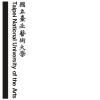Taipei National University of the Arts (TNUA) was founded in 1982 by the government of Taiwan to cultivate young artist talents. Based on different categories of arts, the university is consisted of six schools: Music, Fine Arts, Theatre Arts, Dance, New Media Arts and the research-based School of Culture Resources. This institutional division fosters an interdisciplinary environment for education and research. General disciplinary knowledge of humanities such as history, anthropology, literature and aesthetics are accessed with more art-focused concern within individual school as well as crossing schools. An integrated teaching and learning methodology through production of art works, adopting multiple sources of knowledge (both text and embodied knowledge), is largely applied in most schools and characterizes the pedagogy of the university. Another feature is the core importance of hands-on transmission of embodied knowledge. Both features lead to the uniqueness of educational approach, its potential as well as challenges as a facilitator in the contemporary society.
TNUA has been working with multiple social groups and local communities through arts production, art education and heritage preservation. To give some concrete examples, the project “Growing Together in Guandu” was facilitated by the TNUA and has been co-developed by local communities in the neighborhood of Guandu. Community courses, art projects and students’ participation in the local folk activities were inaugurated to foster a shared vision of Guandu.
The other case is in Daxi, a famous historical wood-carving town in central Taiwan and well-known for community movement of preserving historic buildings. TNUA professors and students have been working with local groups and government to facilitate a wood-carving eco-museum project in searching for an alternative of local development than the current massive tourism. Similar initiative was proposed by the Xizhou indigenous community in north Taiwan. The TNUA Center for Traditional Arts was asked by the community to develop together a better tourist programme for community sustainability.
All the aforementioned cases represent that visual and performing arts, museum and art education, and cultural heritage preservation are the major forms that TNUA developed with different local communities and social groups to foster co-learning and collaborating relationship. This is also important for TNUA teachers and students to be aware that there is no way for art and to-be-artists to stay in isolation. If you expect your art is valuable to someone, then there is urgent need for the to-be-artists to listen to, learn from, communicate and work with people.


